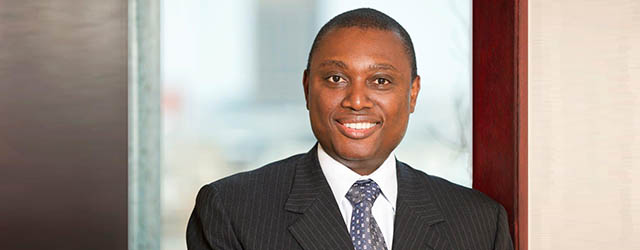Global Finance had a chance to interview Sim Tshabalala in April. The joint chief executive of Standard Bank Group answered questions about Africa’s growth and the substantial demand for banking services on the continent.

Jump To Winners Page
Global Finance: What is the outlook in 2015 and 2016 for banks intent on expanding in Africa—and for Standard Bank in particular?
Sim Tshabalala: Standard Bank remains bullish on growth in sub-Saharan Africa. We agree with most forecasters that the region will grow at faster than 5% a year for at least the next five years, and probably for a lot longer than that.
Africa remains seriously underbanked and underinsured by global standards, and so we think there’s a great deal of room for expansion in the years and decades to come. We expect the demand for financial services will continue to grow rapidly—banking, at about 1.5 times the rate of GDP growth, and insurance, at about twice the rate of GDP growth. Our headline earnings in Africa beyond South Africa have been growing at a compound annual growth rate of 37% over the past five years and now make up 28% of group headline earnings. We expect that share to keep rising.
GF: What are your expectationsfor the future price of oil and its impact on the bank?
Tshabalala: We expect that the oil price will recover gradually from its current lows, but we don’t expect it to return to its 2014 highs for the foreseeable future. Lionel Therond, Standard Bank Group Securities’ oil and gas analyst, predicts an average price of $55 through 2015 before moderately rising to $80 by 2018.
We expect 2015 to be a difficult year for the Angolan economy, but that it should recover in 2016. We think that the Nigerian economy is now sufficiently robust and diversified that it will continue to grow at 5% or faster even with a soft oil price. Large reductions in capital expenditure that were recently announced by almost all industry players will likely delay exploration and the sanctioning of some sub-Saharan African O&G projects.
Despite a low oil price environment, we expect movement on certain developments where projects remain bankable—such as Mozambique LNG [liquid natural gas] and potentially East Africa.Across our upstream and downstream exposures, overall Standard Bank has weathered the oil price decline well.
US and European banks may reduce their African O&G appetite while they resolve US shale exposures, and local banks heavily exposed to O&G-dominated economies will need to consider their position.We see this as a potential opportunity, given our sub-Saharan Africa expertise and deep specialization in natural resources, to further entrench our position as the go-to African energy bank.
GF: What keeps you up at night? What is the main worry for African bankers?
Tshabalala: Our biggest worries include the risk of cybercrime: Africa is rapidly adopting online banking, and our law enforcement authorities are often seriously overstretched. As a result, we’re highly vulnerable to cybercrime. We are also concerned about theunintended consequences of global regulatory developments on Africa. And poverty, inequality and unemployment remain very serious concerns for all Africans. Africa’s rapid growth has been accompanied by improved governance and better human development in many countries, but the continent needs to make more-rapid progress in both areas.



